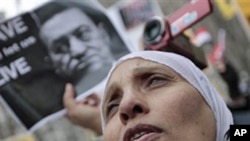Thousands of Egyptians living in New York City are voicing ardent support for regime change back home.
Immigrants from Egypt have long settled near Steinway Street in New York’s borough of Queens, amid mosques and dozens of Egyptian-owned restaurants, hookah parlors, travel agencies and other businesses. Many of their windows today bear posters calling for Egyptian President Hosni Mubarak to leave office - and for Egypt to inaugurate a new democracy. Inside, every television is tuned to live coverage of the street protests in Egypt.
Hany Egag, a computer science student and restaurant worker, says until a few days ago, people in Egypt were afraid to speak out for fear that they would end up in prison.
"If you even criticize the regime, it’s a big deal, like so many people they think first of all, we don’t want to talk about politics, otherwise we’re going to be in jail," said Egag. "Especially if you talked even about what you want, if you are unemployed or you don’t like the corruption, if you talk, you’re pretty sure you’re going to go to the jail. That’s why people, they need the change, we need the change."
But now Egag expects Mubarak to be forced out within days.
"It’s like a magic, like a dream," said Egag. "Because we know Egypt is one of the strongest police states in the Arab world. And all that happened in a few days. And the regime is about to fall off - it’s like magic."
Mohammed Abdgilil also stopped on the street to share his opinion of Mubarak.
"Before, when he start around 1980, he was good. But I think after that he don’t care about the people," said Abdgilil.
Abdgilil and others noted that Egypt is largely poor, and millions don’t have enough to eat.
"Life is very difficult now in Egypt. The people cannot talk about what they are needing," said Abdgilil. "You cannot go get a job - you cannot get food. It’s not good."
Latifa Mzoughi who runs an insurance agency on Steinway Street, is from Tunisia. She said that young, educated people in the Middle East no longer accept having to emigrate in order to live in a democracy - so she expects the democracy movements to spread to other countries.
"There is a lot of young people in our country[ies]," said Mzoughi. "They need to have a job. They need to stay in their country. They don’t want to do like we did, to go overseas. It’s going to be very difficult in the beginning, but they have to take action and of course we expect it’s going to be better."
Mzoughi and several others said that the U.S. and Israel should not fear the influence of the Muslim Brotherhood in a new Egypt. She said they are not anti-Western, but are business owners and community organizers who help the poor. But several people also said that neither the Muslim Brotherhood nor Mohammed ElBaradei would provide the best leadership. Mohammed Abdgilil said ElBaradei had lived outside Egypt for too long - and he added that out of 80 million people, there are many good choices.
"We have a saying in our country - new blood," said Abdgilil. "We have to get the new blood."
Whether recent immigrants, visitors or long-time U.S. citizens, the Egyptians and other Middle Easterners along Steinway Street say they have no doubt that a mass democratic movement is alive in Egypt and cannot be turned back. They are happy to be able to witness it.




